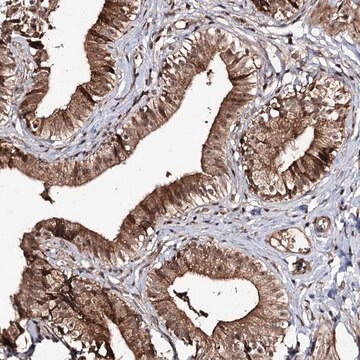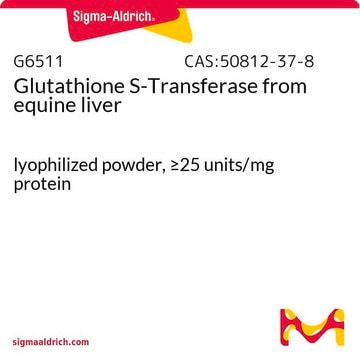GS61
GST A2-2, Recombinant Human
Sinónimos:
GST2, GTA2, GTH2, glutathione S-transferase alpha 2
Iniciar sesiónpara Ver la Fijación de precios por contrato y de la organización
About This Item
UNSPSC Code:
12352200
NACRES:
NA.26
Productos recomendados
biological source
human
Quality Level
recombinant
expressed in E. coli
assay
>95% (SDS-PAGE)
form
frozen liquid
specific activity
15.95 units/mg protein
mol wt
23 kDa
concentration
1.52 mg/mL
storage temp.
−70°C
Gene Information
human ... GSTA2(2939)
General description
using spectrophotometric determination of 1-chloro-2,4-dinitrobenzene (CDNB) conjugation with reduced glutathione (1 mM) in 100 mM NaPO4 (pH 6.5) at 30°C.
Biochem/physiol Actions
Glutathione S-transferase alpha 2 (GSTA2) is an enzyme that in humans is encoded by the GSTA2 gene. Glutathione S-transferases (GSTs) are a family of enzymes that play an important role in detoxification by catalyzing the conjugation of many hydrophobic and electrophilic compounds with reduced glutathione. Based on their biochemical, immunologic, and structural properties, cytosolic and membrane-bound forms of glutathione S-transferase are encoded by two distinct supergene families. At present, eight distinct classes of the soluble cytoplasmic mammalian glutathione S-transferases have been identified: alpha, kappa, mu, omega, pi, sigma, theta and zeta. The GSTs are thought to function in xenobiotic metabolism and play a role in susceptibility to cancer, and other diseases.
The genes encoding these enzymes are known to be highly polymorphic. These genetic variations can change an individual′s susceptibility to carcinogens and toxins as well as affect the toxicity and efficacy of some drugs. This gene encodes a glutathione S-tranferase belonging to the alpha class. The alpha class genes, located in a cluster mapped to chromosome 6, are the most abundantly expressed glutathione S-transferases in liver. In addition to metabolizing bilirubin and certain anti-cancer drugs in the liver, the alpha class of these enzymes exhibit glutathione peroxidase activity thereby protecting the cells from reactive oxygen species and the products of peroxidation.
Storage and Stability
The enzyme should be used by the end-user customer within 1 year of receipt.
Storage Class
10 - Combustible liquids
wgk_germany
WGK 1
flash_point_f
Not applicable
flash_point_c
Not applicable
Certificados de análisis (COA)
Busque Certificados de análisis (COA) introduciendo el número de lote del producto. Los números de lote se encuentran en la etiqueta del producto después de las palabras «Lot» o «Batch»
¿Ya tiene este producto?
Encuentre la documentación para los productos que ha comprado recientemente en la Biblioteca de documentos.
Los clientes también vieron
Francesca Bonifazi et al.
Haematologica, 99(1), 172-179 (2013-09-24)
Busulfan liver metabolism depends on glutathione, a crucial mediator of cellular and systemic stress. Here we investigated 40 polymorphisms at 27 loci involved in hepatic glutathione homeostasis, with the aim of testing their impact on the clinical outcome of 185
Takehiro Matsumura et al.
FASEB journal : official publication of the Federation of American Societies for Experimental Biology, 27(8), 3198-3208 (2013-05-08)
Steroidogenic factor 1 (SF-1) is a master regulator for steroidogenesis. In this study, we identified novel SF-1 target genes using a genome-wide promoter tiling array and a DNA microarray. SF-1 was found to regulate human glutathione S-transferase A (GSTA) family
Keiko Maekawa et al.
Drug metabolism and pharmacokinetics, 26(6), 646-658 (2011-08-17)
Glutathione S-transferases (GSTs) play a vital role in the phase II biotransformation of many chemicals, including anticancer drugs. In this study, to elucidate the haplotype structures of the two closely related alpha-class genes GSTA1 and GSTA2, we screened for genetic
Jingping Xie et al.
Journal of cellular biochemistry, 95(2), 339-351 (2005-03-22)
The effectiveness of bifunctional alkylating nitrogen mustard compounds in chemotherapy is related to their ability to form DNA inter-strand crosslinks. Patients exposed to DNA inter-strand crosslinking (ICL) agents subsequently experience an elevated incidence of myelodysplastic syndromes (MDS) and MDS related
Susana N Silva et al.
Oncology reports, 22(3), 593-598 (2009-07-30)
Glutathione-S-transferases (GSTs) are a super-family of phase II metabolizing enzymes that catalyse the detoxification of a large range of endogenous and exogenous toxic compounds, playing an important role in protecting cells against damage, through glutathione conjugation with electrophilic substances. Polymorphic
Nuestro equipo de científicos tiene experiencia en todas las áreas de investigación: Ciencias de la vida, Ciencia de los materiales, Síntesis química, Cromatografía, Analítica y muchas otras.
Póngase en contacto con el Servicio técnico









